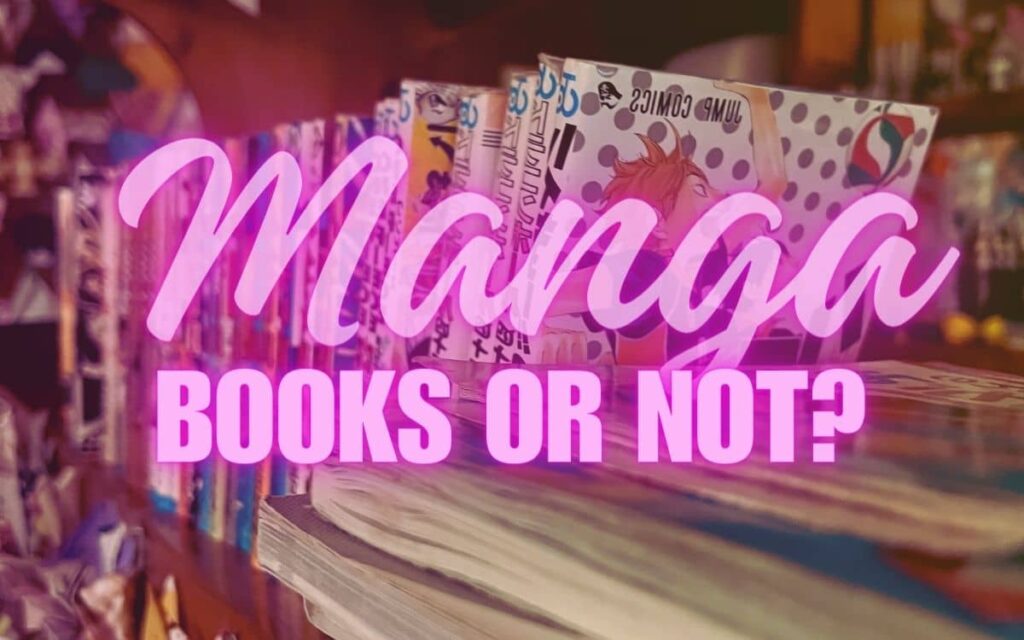Guys! The Otakus are on the rise.
Accept it or not. Mangas are dominating the global market, transcending their home borders. As an admirer of Japanese culture and literature, I can only sit back and enjoy this trend.

You know what’s the best part of a manga? Storyline? Sure. But I would give most of the credit to the graphics. The visuals are so well-detailed and realistic that they have successfully captivated readers of all ages (No kidding! I am 23 and spend a big chunk of my salary on manga).
Recently, a conversation regarding manga’s literary value (and blah blah blah…) has caught my eye. A group of big-brainers (!) refuses to accept manga as books. As per them, some childish scribbling on paper is no literature.
Oh hello! I think you haven’t done your homework before opening your mouth. But don’t worry. I am here to prove you wrong. Today, I will debate over only one topic: Does Manga count as books? So, be prepared to get introduced to a new line of literature!
Let’s Start With The Manga Definition
Manga is a Japanese comic book or graphic novel. – Merriam Webster
According to Collins Dictionary, Manga is a Japanese genre consisting of comic books and graphic novels, typically black-and-white, featuring stylized characters with large, round eyes.
The Oxford Reference addressed manga as a Japanese genre of cartoons and comic books, notably longer than non-Japanese works in these genres.
In simple terms, manga is the Japanese form of comics. It is a visual storytelling technique that has a distinct art style.
These artworks are highly detailed. Each character and scene drawn on pages is super expressive and conveys strong emotions.
Even though we tag manga as Japanese comics, the differences are quite visible. I mean, just look at the cartoon.
Each character seems Godly perfect with wide doll eyes and blushing beauty. Such dedication is rare in the western comics.
Besides, you can’tcomplain about the plot, even when you pick up an average manga. The storyline is always better, more mature, and more meaningful than those comics.
Hey! Here is an interesting fact about manga. While we read comics from left to right, we ought to do the opposite with mangas. Here, the storyline will only make sense if you go from right to left.
Mangas Definitely Count As Books. Let Me Tell You Why
I believe the scholars live in a literary bubble of their own. They strongly believe that no comics and graphic novels (which include manga) should be treated as real books. Why not?
They give very poor logic for it. For example, mangas are too easy to read, filled with visuals, have no artistic merit, are poorly written, and are made for children.
Oh! Is that right? Let me debunk these misconceptions one by one.
First of All, Manga Is Not Only for Kids
Sure, the children are the potential customers. But the majority of manga readers (around 60%) belong to the 20 to 29 age group. I didn’t just assume this. The numbers are coming from authority sources.
Considering the huge interest and demand, the publishers launch several categories and genres according to age group. For children, Kodomo manga is famous. And for adults, there is no limit. We have Seinen, Shōjo, Seijin/Ero, Josei, Hentai, and whatnot.
Not only that. Each category of manga is available in several genres. You can choose action, romance, sci-fi, or drama per your mood. If someone still claims that manga is for babies, he should walk the hall of shame.
Second, What’s So Wrong in Easy Words?
You can’tjudge a piece by the glossary used in it.
Come on! No one talks in Shakespearean English nowadays. Right?
The main purpose of any language is to deliver your speech and expression in a smooth way. No? Then what’s wrong if manga uses a light tone?
It is the plot that matters, and trust me. The majority of manga highlights an intricate storyline. The artists combine the graphics and texts, making the plot as real as possible.
I would say the manga fans barely give a damn about the literary or trashy language. They care about the story, and the book offers them a good one.
See, I am not implying that manga is never poorly written. No, instead, these comics are so well-developed that they evoke a surge of emotion among the readers.
Haven’t you seen the fan craze over the manga characters? Are you saying those adults are dumb to drool over something nonsense?
Thirdly, Manga Is An Art Form
I doubt people who say manga has no artistic merit have even read one in their life. Or I guess they are reading some crappy manga. Otherwise, how can they talk such shit?
Take Naruto, One Piece, or Dragon Ball Z as examples. Sure, the plots are stretched in a fun and childish way. Still, you can’tignore the insight these manga offer into human relationships or psychology.
The daunting voice of authors in traditional books is also found in the manga. You will barely see an artist shying away from spilling out the social complexities via satire, sarcasm, or humor. If you do not find artistic merit in those, it is definitely a YOU PROBLEM.
And Finally, Graphics Are Not An Issue
I don’t know why, but scholars are mostly irritated with manga because there are more graphics and fewer texts. What makes them so scared of illustrations?
See, mangas are graphic novels. So, obviously, they will contain tons of cartoons. And by the way, I have read literature books that include illustrations to make the plot interesting. If the scholars have no issue with those pieces, why are they rioting over mangas?
What’s My Point?
I have encountered each point raised by those big-brainers. Haven’t I?
Mangas are definitely books. There is no doubt about it. But if you still want to create a fuss over this simple issue, please help yourself.
What’s So Different Between Manga & Books?
Yes, manga is not like any regular novels that we read. I don’t deny the fact. It is stuffed with graphics. The text percentage is only 10% – 15%. On the contrary, you will barely find any illustrations in regular books.
The storytelling approach is also very different in manga from traditional novels. Decoding the texts is enough to enjoy regular books. But for manga, you must have a good eye to scan illustrations. Otherwise, the plot will make no sense at all.
Also, most manga come in volumes. Publishers take years to finish a hit manga. However, 70% of the novels we read are standalone books.
Obviously, I can go on and on and on! There might be a bundle of differences between traditional books and mangas. But aren’t they serving the same purpose? To entertain people, to convey a message, to introduce new cultures?
I strongly feel the philosophy of all sorts of literature is the same: to pass a message or an emotion. In my view, manga does this job quite meticulously. I have seen Japan and Japanese culture through manga pages.
Reading a manga makes me feel attached to the characters and to the plot. This is the same emotion I feel when I go through any traditional novel.
So, regardless of the differences, manga and regular books share the same essence and serve the same purpose.
Let’s Make Peace. Shall We?
You can call manga a cute drawing or whatever. Yet, you can’t deny the literary values of these graphic novels. Keep in mind that many mangas have received international recognition.
Of course, you will find mangas that are nothing more than trash. But do not judge the entire genre based on some mediocre pieces. We do not boycott romance novels just because of CoHo. Right?
Let’s call it even. And why don’t you just give manga another chance? Who knows, you might join the Otaku club soon.
